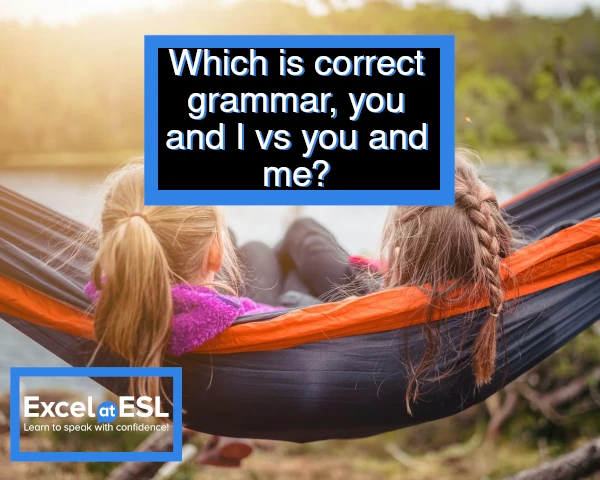You and I vs you and me. The perennial debate. This is a common question, even among native speakers! Grammar can be a tricky subject. Most people don’t know the nitty gritty details about grammar, so it’s difficult for them to explain why something is correct or not. (Check out my article “Why is English Grammar Important?” to learn the reasons why you should learn [at least a little bit!] about grammar.) People often feel that the correct thing to say, in all instances, is “you and I”, but is that right?
Both “you and I” and “you and me” are correct. The usage depends on the grammatical function of the noun phrase. “You and I” appears as a subject, while “you and me” appears as the object in a sentence.
Table of Contents
The Underlying Grammar
Before we get to how both of these phrases are correct, we need to talk about why they are both correct. The reasons have to do with English grammar.
Let’s Talk About Nouns
Every word in a sentence is doing a specific job to impart meaning to the reader or listener. In this case, we are talking about nouns.
A noun is a person, place, or thing. So, in our example, the nouns we have are “you” and “I”. They are joined together by the word “and” into a single unit. This unit is called a ‘noun phrase*‘. You can think of it as a package of nouns. “You” and “I” are stuck together into a single package, “You and I”.
- John or Sarah
- dogs and cats
The above are two more examples of noun phrases. Two nouns are joined together into a single package. You can tell that these are single units because they can be moved around in a sentence together.
 They like dogs and cats.
They like dogs and cats. Dogs and cats like them.
Dogs and cats like them. Dogs and cats are liked by them.
Dogs and cats are liked by them.
The important thing to recognize is, although we have a single packaged noun phrase, two separate entities make up the package. So, in our example, two animals (“dogs” and “cats”) are liked. The same is true for “You and I”. There are two separate people in that single noun phrase.
*This explanation of a noun phrase is a bit simplistic, but it suits our purposes here. Don’t worry too much about the specifics, as long as you understand what we’re talking about here, you’re fine!
What are Grammatical Categories?
In every sentence, we have different participants. Some are the doer of an action and some are the receivers of that action. This is the most simple way to understand the distinction.
In English, we call the doer of the action the subject. The receiver of the action is the object. Sometimes, you might see the subject called the ‘nominative‘ and the object might be called the ‘accusative‘. Don’t worry about this fancy jargon. These grammatical categories are fundamental to our current question. “You and I” and “you and me” are both correct because they depend on this grammatical category distinction.
- Dogs like cats.
In the example above, “Dogs” is the subject of the sentence and “cats” is the object. In English, most of the time, the position of the word in the sentence tells you the grammatical category. The first word is the subject and the second word is the object.
- Cats like dogs.
If we switch the two words, their grammatical categories switch too. Now, in the example above, “cats” is the subject and “dogs” is the object. Their categories are different, but they look the same. This isn’t always the case, however.
In many European languages, the category of the noun affects its form. Nouns look different based on their grammatical category. This even happens in English! Let’s take a look:
- I like them.
- They like me.
These examples are the same as the two above. This time, however, the words switch forms when they switch grammatical categories. We use “I” and “they” in the subject position of sentences and we use “me” and “them” in the object position.
You and I vs You and me
Finally, this brings us to the current question. You probably already understand what’s going on here, but let’s talk about it.
“You and I” is used in the subject position of sentences, while “You and me” is used in the object position. It’s as simple as that!
Subject Position Examples
- You and I made dinner for my brother.
- Sheila and I helped John move.
Object Position Examples
- My brother made dinner for you and me.
- John helped me and Sheila move.
Notice that “I” always comes second in the noun phrase. There isn’t a real reason for this. This is how English speakers like to order this particular noun phrase and it sounds odd when you don’t.
 I and you made dinner for my brother.
I and you made dinner for my brother. I and Sheila helped John move.
I and Sheila helped John move.
Of course, you can check to see which is correct by taking one of the people out of the noun phrase. Remember how we said that there are two entities to every compound noun phrase? If you’re ever unsure about which to use, take out one of the people and see if it sounds okay.
 You and I made dinner for my brother.
You and I made dinner for my brother. I made dinner for my brother.
I made dinner for my brother. You and me made dinner for my brother.
You and me made dinner for my brother. Me made dinner for my brother.
Me made dinner for my brother. John helped Sheila and me move.
John helped Sheila and me move. John helped me move.
John helped me move. John helped Sheila and I move.
John helped Sheila and I move. John helped I move.
John helped I move.
Use this simple test and you can easily tell if you should use “you and me” or “you and I”!
Between You and I vs Between You and Me
This is an idiom that may have caused you trouble, but not anymore! This follows the exact same pattern as the one above.
This phrase always appears in the object position, so “between you and I” is never correct. It will always be “between you and me”.
Examples
- So, just between you and me, he doesn’t like tacos?
- Let’s just keep this between you and me.
- The difference between you and me: I like purple and you like red.
Conclusion
When trying to decide between ‘you and me’ or ‘you and I’, think about the grammatical category of the words. Is this the subject or is it the object? Try out the test above. Remove one of the people from the noun phrase and see if it still sounds alright.
The rule to remember is simple. “I” and is always used in the subject position and “me” is always used in the object position!



